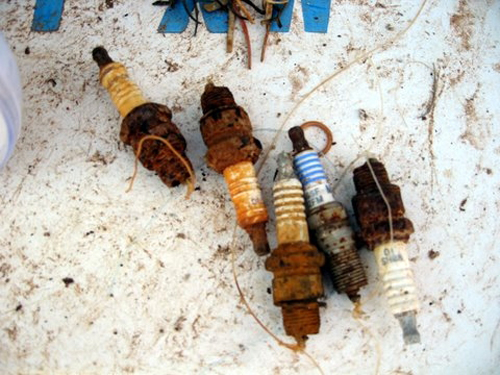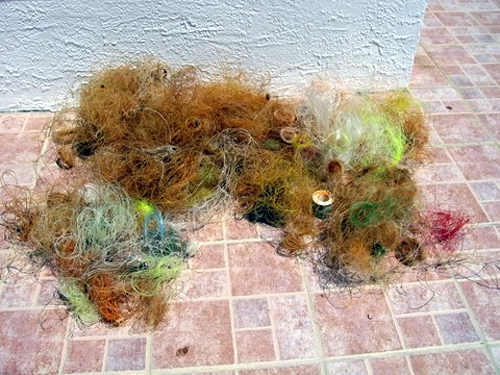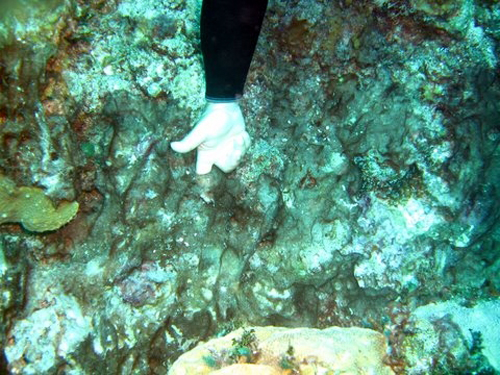
All sorts of objects were collected during last September's Coastal Cleanup.
|
Let us stop, think and ask ourselves a few questions. When you hear the words pollution and coral reefs, what image comes to mind? Do you think of a vast oil spill over the surface of the ocean? Do you picture the image of a 6-pack bottle ring floating around the neck of a turtle? Or are you unable to relate the two words at all? Up until recently, the seas have been the dumping grounds for many pollutants. It was once believed that dilution was the solution to pollution. We thought the ocean had the power to not only dilute, but also absorb and vanish away any pollutant which entered it.
However we have learned that our waste, even in small amounts can have a large affect on the quality of our coral reefs and our way of life. The year 2008 is considered the International Year of the Reef. During this time let us reflect on how important these vast colonies of animals are to our own local economy. Rather than bore you with general facts and figures, how about we consider specifically why coral reefs are such a big deal to our islands of the Bahamas.
First of all, coral reefs provide us with food. Any casual fisher can tell you that the nooks and crannies found between the various reefs are safe houses for an abundance of marine life ranging from the spiny lobsters, to groupers and the yellow tail snappers.
Secondly, the coral reefs provide us with storm security which is priceless. The growth pattern of reefs is such that they “put themselves” at the mercy of an oncoming wave and are the first to take the brunt of the storm, thereby decreasing the size of the oncoming wave or surge. A third benefit of the reef is the boost in our Bahamian economy. Its’ natural beauty and abundance of marine life provides indirect employment and business opportunities to countless persons. Overall, we can say that the Bahamas owes much its economic strengths to these colorful underwater animals.

Fishing line collected at moored dive sites. Over 6 pounds, or 384 pieces
of fishing tackle were tangled around reef life, choking off coral and
sponges, as well as creating a hazardous condition for divers.
|
However the health of our coral reefs is threatened by several factors. I will discuss only one of those which is ‘Pollution’. Pollution stems from daily activities and events occurring both on the island (land based pollution) and in the sea (marine based pollution).
Worldwide, land based sources of pollution are believed to be responsible for more than 75% of the marine pollution. Of this percentage, a great deal will eventually come in contact with healthy reefs. In Bahamian society most of us would agree that a beach party is not quite a beach party if there isn’t some food and drink on hand. What do we do with the plastic forks, plates, cups and general waste once we are finished? Where does the loose litter that is dropped on the side of the street eventually end up? Considering the fact that we live on an island, it would not take much time for litter to be transported to the nearest water body whether it be canal or ocean. Once this occurs, it is possible for this debris to be flushed out to the reef with the tidal flow.
Certain marine life would readily ingest pieces of garbage assuming it is food. This results in a temporary feeling of fullness and eventually leads to asphyxiation. What about our septic tanks? Are they placed too near the coastal waters? Are they in proper working order? If not, then we run the risk of too many nutrients entering our waters, excessive algal growth smothering and destroying the reef system. The solution lies in proper maintenance and location of the septic system. What about solid waste found in our own yards and neighborhoods? This waste not only endangers human health, but can pollute the coastal waters and coral reefs through runoff and leaching via groundwater. A solution is to dispose of waste in a bin and ensure that it is always covered
Marine based sources of pollution threaten our reefs as well. Who would have thought that during a relaxing fishing trip on the sea, throwing an empty soda can or candy wrapper could result in lowered fish populations? Who would have thought that refueling or changing motor oil while at sea could potentially result in a chain reaction which could lead to our own fish poisoning? Or even serious health affects? I know these sound like far-reaching events, however just as our earth is round, so is the interaction between humans and the environment. Once pollutants such as the heavy metals (which are found in oil and gasoline) enter the sea, they become stored in the bottom of the ocean and also in sea plants. Eventually these plants are eaten by smaller marine life such a fish, crabs and conchs, resulting in an even higher amount of pollutant build up. Finally, a large or top predator such as grouper and barracuda will consume the smaller marine life.
At this point, the level of pollutant accumulates in even higher amounts in the top predator and will affect our own health once we consume them. This food chain represents the basic circle of life. Everything we do today can and will affect us tomorrow.

Sewage fertilizes this slime, smothering the reefs offshore of Lucaya.
|
So let us stop for a moment and reflect on the wonderful gift that was entrusted to us from God, the gift of a pristine, rich and healthy environment. Let us take back our responsibility over our surroundings. It was given to us to use for our benefit meanwhile securing it for future generations. During this International Year of the Reef share with your kids, parents, relatives and friends how important it is for each of us to just stop, think and ask ourselves a few questions about our environment.
About the Author: Tansey Louis is the o
wner of Bahamas EcoVentures Company, Limited, and has a Bachelor of Science in Environmental Biology. She can be reached at: tours@bahamasecoventures.com
